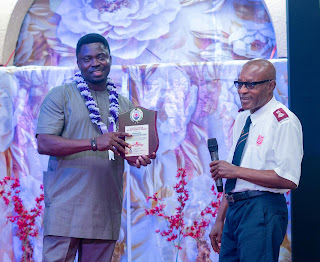The 3rd Agribusiness Roundtable International Conference held in Uyo, Akwa Ibom State, concluded with a strong call for collaboration, innovation, and sustainable practices to drive the future of agriculture in Nigeria and beyond.
Key Highlights:
• Focus on Sustainability and Resilience: The conference highlighted the urgent need to adapt to climate change, resource scarcity, and evolving consumer demands. Participants emphasized the importance of sustainable farming practices, climate-smart agriculture, and building resilient food systems.
• Harnessing Technology for Growth: Agritech innovations took center stage, with discussions focused on leveraging technology for improved productivity, efficiency, and access to markets. The conference recognized the transformative potential of data analytics, precision agriculture, and digital platforms in driving agricultural growth.
• Investing in the Future: There was a strong emphasis on the need for increased investment in research, development, and deployment of agritech solutions. Participants acknowledged the critical role of public and private investment in fostering innovation and advancing sustainable practices.
• Building Inclusive and Resilient Value Chains: Participants stressed the importance of building equitable and inclusive value chains that empower farmers, create jobs, and promote economic growth in rural communities.
• Collaborative Partnerships: The conference highlighted the importance of collaboration and partnerships between governments, businesses, farmers, and researchers. Participants emphasized the need for a coordinated approach to tackling challenges and driving sustainable development in the agricultural sector.
KEY RESOLUTIONS:
PARADIGM SHIFT
There is a need for a paradigm shift and reorientation of operators in the agribusiness space. Farmers are urged to join Cooperatives and Chambers of Commerce, Industry, Mines and Agriculture, rather than venture as lone rangers. Gender and youth inclusion should be encouraged, promoted and incentivized.
There is a need to streamline agriculture into mainstream business circles and regard it as such for it to thrive, rather than as a subsistence venture. Subsidies to agriculture should be at the front burner in national discourse given its importance, and its potential to uplift farmers – and by extension the general populace - from peasant level to the economic upper class.
A more specialized funding vehicle or strategy needs to be incepted by, for instance, adequately capitalizing the Bank of Agriculture to lend more funds to practicing farmers.
ADAPTABILITY:
The future of agribusiness and the sustainability of agricultural production hinge on adaptation to certain factors such as environmental, notably climate change, the mitigation of which has to be taken more seriously by all government agencies concerned as well as individual farmers themselves.
STATUTORY FACTORS:
Other key factors impeding enhanced agribusiness sustainability are policy inconsistency, multiple taxation and other statutory requirements. There are myriad of codes, standards, legislation and other constraints which vary from country to country. The conference advocates a unified body to enlighten and assist farmers to overcome these hurdles.
PROTECTION OF SELLERS AND CONSUMERS:
It is noteworthy that government has done a lot in the area of consumer protection, in terms of laws to abolish market unions which constituted themselves into negative protectionist cabals. However, a lot more needs to be done to enforce those laws.
ACCESS TO INPUTS AND FINANCE:
A major constraint to large scale production and processing of agricultural commodities is the bottle neck often encountered by farmers in the quest for funding. The conference is aware of the existence of a number of development banks funding agriculture and allied ventures. However, there is need to simplify the process of accessing these funds and render them more farmer friendly. Inputs such as improve seedlings, fertilizers, equipments and others should be a matter of priority to the Federal, States and Local Governments
ACCESS TO MARKET:
The multifarious international concessions and agreements such as AGOA and AfCFTA designed to enable local agricultural producers and exporters gain access to the USA, Europe and other international markets are commendable organs which unfortunately have not been fully exploited to the benefit of stakeholders. For instance, AGOA has been minimally utilized by agribusiness entrepreneurs in Nigeria. Incidentally, AGOA is expiring in one year’s time. i.e. October 2025. Conference participants called for robust diplomatic advocacy to renew it.
CURRENT REALITIES:
In the light of current realities, globally, some of the foremost challenges farmers face in a bid to enhance their production are; information, documentation, standardization and technology, or rather, the paucity of these.
ADAPTABILITY:
The future of agribusiness and the sustainability of agricultural production hinge on adaptation to certain factors such as environmental, notably climate change, the mitigation of which has to be taken more seriously by all government agencies concerned as well as individual farmers themselves.
Promote Sustainable Agriculture: Participants committed to advocating for and implementing sustainable agricultural practices that prioritize environmental protection, resource conservation, and biodiversity.
Drive Agricultural Technology Innovation: The conference encouraged investment in and adoption of tech solutions to improve productivity, efficiency, and sustainability in the agricultural sector.
Foster Inclusive Growth: Participants recognized the need to ensure inclusive agricultural development that empowers small-scale farmers, women, and youth.
Strengthen Partnerships: Attendees committed to fostering collaborative partnerships between all stakeholders in the agricultural ecosystem to achieve shared goals for sustainable development.
Promote Policy and Regulatory Frameworks: The conference highlighted the need for supportive government policies, regulatory frameworks, and financial incentives to encourage investment in and growth of the agricultural sector.
MOVING FORWARD:
The Agribusiness Roundtable International Conference served as a vital platform for exchanging ideas, forging partnerships, and inspiring action. Participants left the conference empowered and committed to working together to transform the agricultural landscape in Nigeria and beyond. The organizers are confident that the insights, collaborations, and initiatives sparked by this event will drive lasting change and contribute to a more sustainable and prosperous future for the agricultural sector.
Nigeria Agribusiness and Agro-Industry Development Initiative (NAADI)










.jpeg)















